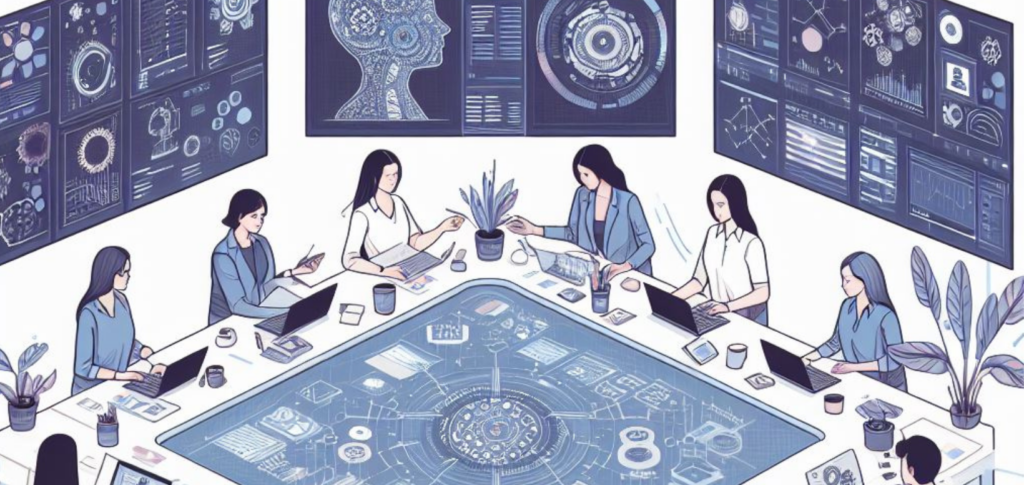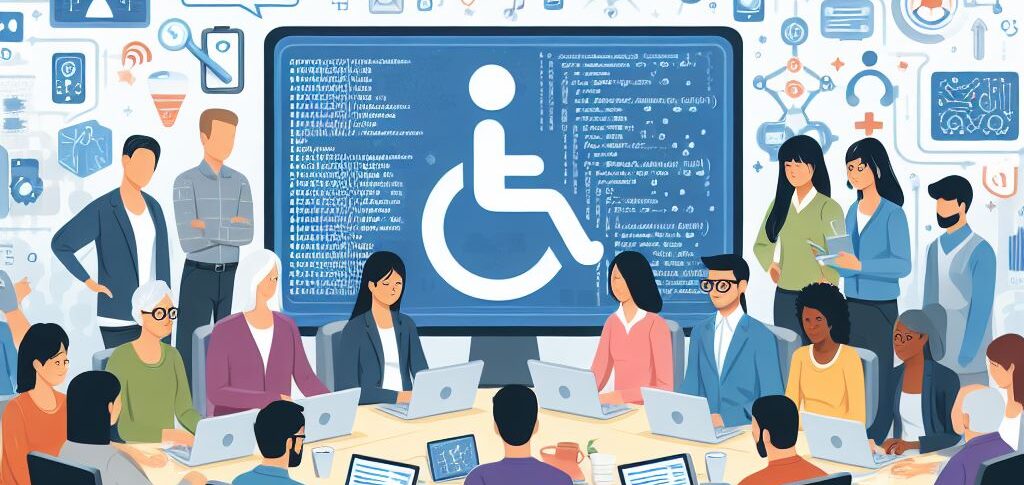This article was developed based on research “The effects of artificial intelligence on women’s professional lives[1]”, a collaborative study carried out by UNESCO, the OECD (Organization for Economic Cooperation and Development) and IBD. The research addresses how artificial intelligence (AI) is transforming the work environment and what its specific impacts are on the professional careers of especially women.
ADVERTISING
Initially, do you know what Artificial Intelligence is about? Here I bring a small portion of the definition highlighted in the research, namely:
Artificial Intelligence (AI): An AI system is “a machine-based system that can influence the environment that produces an outcome (predictions, recommendations, or decisions) for a given set of objectives. AI uses human and/or machine-based data and interventions to (i) perceive real and/or virtual environments; (ii) abstract these insights into models through analysis in an automated (e.g., with machine learning) or manual manner; and (iii) use model inference to formulate options for obtaining results. AI systems are designed to operate with varying levels of autonomy” (OECD, 2019b). They comprise “machines capable of imitating certain functionalities of human intelligence, including characteristics such as perception, learning, reasoning, problem solving, linguistic interaction and even producing creative work”[2].
The advancement of Artificial Intelligence (AI) promete profound transformations in various sectors, promoting everything from efficiency improvements to the creation of new products and services. However, it is crucial to examine how these changes affect different segments of the population, especially women, who have historically faced inequalities in the labor market.
ADVERTISING
AI can represent both an opportunity and a challenge for the inclusion of women in the job market, especially in the areas of science, technology, engineering and mathematics (STEM). Women are still a minority in these areas and often earn less than their male colleagues, in addition to holding fewer leadership positions.
The aforementioned study pointed out that AI can both perpetuate and mitigate existing gender inequalities, from some perspectives:
- Automation and Skills: AI-driven automation could eliminate or transform many jobs, requiring new skills and qualifications. Women need to have equal access to training and professional development in areas influenced by AI to avoid being abandoned.
- Hiring and Recruitment: AI systems used in recruitment processes can reduce unconscious bias, as long as they are properly programmed to avoid existing bias. However, if not carefully monitored, these systems can replicate or even intensify discrimination. There are even cases like these.
- career development: AI also offers tools for personalized professional development, enabling women to advance their careers in a more informed and structured way.
Cultural and Social Impact of AI
It's really lovely to think that, even in a world flooded with technological advances and artificial intelligence, we still have the freedom to choose.
ADVERTISING
🇬🇧 Subscribe to the best newsletter about AI (in English 🇬🇧) (I.e. Sign it the best newsletter about AI (in Portuguese 🇧🇷)
We can choose to embrace or reject new trends as they emerge. This ability to choose highlights the beauty of human diversity and individual autonomy. Even with all the rapid and constant changes, the power to decide how we want to interact with these innovations remains in our hands. This highlights the importance of reflecting on how technologies affect our lives and which aspects of them we want to incorporate or not into our daily lives. Here is the power of school, whether of women or any human being.
The fact is that the impact of artificial intelligence (AI) is vast and penetrates far beyond the job market, reconfiguring cultural and social norms in significant ways. One of the most important aspects highlighted in the research is the need to consider key factors, these include:
- Recognition and Respect for Differences: Reflect the diversity of society in their algorithms and functionalities, avoiding perpetuating gender stereotypes.
- Participation in Policy Formulation: Women must be involved in formulating policies that govern the development and use of AI by ensuring that their voices are heard and that their specific concerns are addressed.
This critical look at gender diversity, especially for AI algorithms, is important, as they can perpetuate gender stereotypes if not adequately supervised and adjusted, they can generate what we call “algorithmic discrimination[3]". This is because many AI systems learn from large volumes of historical data that may contain gender bias. But it's worth remembering that this historical database and algorithms were trained and reconfigured by humans.
ADVERTISING
On the other hand, it cannot be ruled out that AI also offers tools to challenge these stereotypes, through educational programs and initiatives that promote more equitable representation of genders in various sectors, including computational intelligence, quantum computing and others. And this is exactly why the research “The effects of artificial intelligence on women's working lives” was developed, to raise awareness about the prevalence, technical functionality and possible consequences of AI systems, as well as document current and future possible effects of AI on women in their workplaces, to raise awareness of the varied and widespread effects of AI on women, and to present the specific challenges and opportunities of emerging AI technologies.
Finally an answer. It will be?
For AI enthusiasts, the report aims to contribute to the broad debate about the role of women in AI by analyzing the potential impacts of automation on their careers and professional opportunities. The study also illustrates that there is currently no definitive answer to how AI-driven automation will change women's jobs. However, as AI can automate even complex and non-routine tasks, governments and organizations must focus on giving women the opportunity to develop digital, creative, social and emotional skills that allow them to adapt and thrive in the era of AI. Who disagrees?
[1] Published in 2023 by the United Nations Educational, Scientific and Cultural Organization (UNESCO), 7, place de Fontenoy, 75352 Paris 07 SP, France; by the Inter-American Development Bank (IDB), 1300 New York Avenue, NW, Washington, DC 20577, USA; by the Organization for Economic Co-operation and Development (OECD), 2, rue André Pascal, 75016 Paris; and by the UNESCO Representation in Brazil.
ADVERTISING
[2] (UNESCO, 2019b)
[3] Algorithmic discrimination is a concept that corresponds to the act of algorithms taking discriminatory or exclusionary attitudes towards human beings. These attitudes can range from simple errors in facial detection, to the conviction of an individual by legal algorithms based on their racial characteristics. Algorithmic discrimination is directly related to algorithmic bias.
🇬🇧 Subscribe to the best newsletter about AI (in English 🇬🇧) (I.e. Sign it the best newsletter about AI (in Portuguese 🇧🇷)




